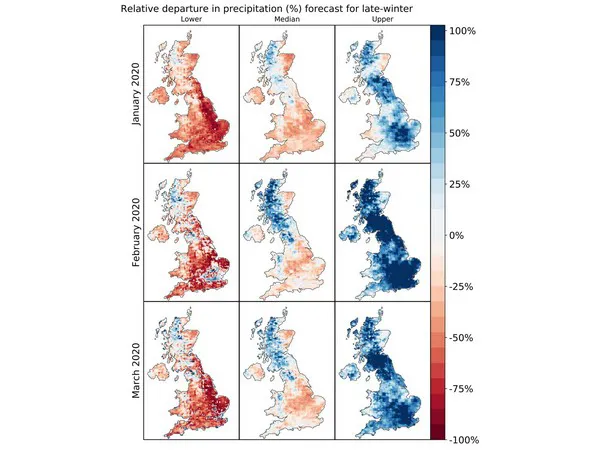How can you manage the risks created by weather? AI and data modelling are offering new ways to mitigate the impact: bespoke weather forecasting to optimise crop scheduling; a novel way to predict extreme events, and an insurance policy to protect against price volatility are to be discussed at an Agri-TechE event ‘Keeping a Sunny Outlook – De-risking Agriculture Through Weather-Tech’ on 29th April 2020 near Norwich.

The recent heavy rain was predicted back in December in a long range forecast by Weather Logistics, as CEO Chris Nankervis explains: “Large irregularities in the usual patterns of rainfall across the British Isles are largely a result of our Atlantic jet stream airflow, a high-altitude ribbon of fast-moving air that steers our weather systems. In recent years, this has resulted in a marked increase in the volatility of farming incomes.”
Weather Logistics can detect disruptions in the jet stream throughout the year and uses this, and other data, to create bespoke weather forecasts. Farmers can use this information to improve decision-making such as delaying or bringing forward drilling or other farming operations to avoid adverse seasonal weather conditions.
The decade of 2010-2019 was the hottest since records began according to the Copernicus Climate Change Service (C3S), which also revealed that each of the last five years have been the warmest on record. Chris continues: “There are now concerns that stagnation of the jet stream is leading to changes in the Arctic and more extreme weather events. The impact of this would be more frequent and intense extreme weather conditions such as prolonged heatwaves, droughts and more widespread and severe flooding events.
“Unlike temperature, rainfall is irregular in both space and time. However, using many computer models with input from several weather providers, we are confident that we now have the best tools in place to reliably inform growers about the likelihood of a soaker.”
Chris estimates that optimising crop scheduling for those in the horticultural industry could increase profit margins by up to 20% and ensure that delivery programmes are met with food retailers. He says: “Integrating long-term weather forecast data into decision-making platforms offers more efficient land use and the opportunity to optimise fresh produce supply, reduce pesticide use and improve smart water use.”
The Agri-TechE Pollinator event ‘Keeping a Sunny Outlook – De-risking Agriculture Through Weather-Tech’ is taking place on Wednesday 29th April, 4pm, at Hethel Innovation, Norwich NR14 8FB.
For more information visit www.agri-tech-e.co.uk/upcoming-events/
